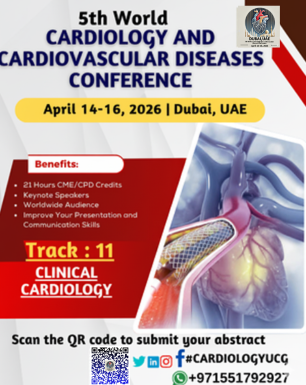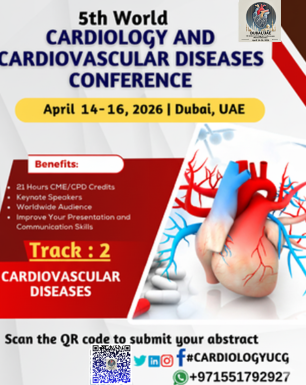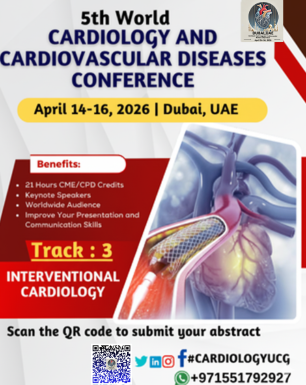Sub Tracks: clinical-cardiology :
Coronary Artery Disease, Heart Failure, Hypertension, Atrial Fibrillation, Cardiovascular Risk Assessment, Valvular Heart Disease, Heart Murmurs, Cardiomyopathy, Acute Myocardial Infarction, Arrhythmias, Cardiac Imaging, Echocardiography, Stress Testing, Electrocardiography (ECG), Hypertrophic Cardiomyopathy, Peripheral Arterial Disease,
What is clinical-cardiology?
Clinical cardiology is a specialized branch of medicine focused on the
diagnosis, treatment, and management of heart and vascular conditions in
patients. It involves understanding and addressing a wide range of
cardiovascular diseases, including coronary artery disease, heart failure,
arrhythmias, valvular heart diseases, and congenital heart defects, among
others. Clinical cardiologists work with patients to manage and treat these
conditions through various diagnostic methods, medications, lifestyle
modifications, and interventions.
Key Areas in Clinical Cardiology:
1.
Coronary
Artery Disease (CAD):
- This
involves the narrowing or blockage of coronary arteries, typically caused
by atherosclerosis. Clinical cardiologists manage CAD through lifestyle
changes, medications, and procedures such as coronary artery bypass
grafting (CABG) or percutaneous coronary interventions (PCI) like
angioplasty and stenting.
2.
Heart
Failure:
- Clinical
cardiologists diagnose and manage heart failure, a condition where the
heart is unable to pump blood effectively. They focus on improving
symptoms, preventing hospitalizations, and enhancing the quality of life
through medications, lifestyle modifications, and advanced treatments
like heart transplants or ventricular assist devices (VADs).
3.
Hypertension
(High Blood Pressure):
- Hypertension
is a leading risk factor for heart disease and stroke. Clinical
cardiologists work on diagnosing and controlling blood pressure through
medications, diet, and lifestyle changes to prevent complications like
heart failure, stroke, or kidney damage.
4.
Arrhythmias
(Irregular Heart Rhythms):
- Cardiologists
diagnose and treat arrhythmias, including atrial fibrillation,
ventricular arrhythmias, and bradycardia. They use a combination of
medication, lifestyle changes, and interventional treatments like
catheter ablation, pacemakers, and defibrillators to manage these
conditions.
5.
Valvular
Heart Disease:
- Conditions
affecting the heart valves, such as aortic stenosis or mitral
regurgitation, are diagnosed and managed by clinical cardiologists.
Treatment may include medical management or surgical interventions like
valve repair or replacement.
6.
Cardiac
Imaging:
- Clinical
cardiologists use various imaging techniques, such as echocardiography, CT scans, MRI, and nuclear medicine to
assess the heart's structure and function. These tools help diagnose
heart conditions, monitor treatment effectiveness, and guide surgical
interventions.
7.
Cardiovascular
Risk Assessment:
- Cardiologists
assess risk factors like high cholesterol, diabetes, smoking, family
history, and sedentary lifestyle to determine a patient's risk of
cardiovascular diseases and design preventive strategies.
8.
Cardiovascular
Prevention:
- Prevention
strategies are an essential aspect of clinical cardiology. Cardiologists
work on reducing the risk of cardiovascular events by managing risk
factors like high blood pressure, high cholesterol, obesity, and smoking
through lifestyle counseling, medications, and health screenings.
9.
Pediatric
Cardiology:
- Some
clinical cardiologists specialize in heart conditions in children,
including congenital heart defects, arrhythmias, and cardiomyopathies.
Pediatric cardiologists work closely with other specialists to manage
these conditions early in life.
10. Cardiovascular Pharmacology:
- Clinical
cardiology includes the use of various medications such as
anti-hypertensives, statins, anticoagulants, antiarrhythmics, and
inotropes. Cardiologists are experts in prescribing and managing these
medications to control symptoms and prevent complications.
Diagnostic Methods in Clinical
Cardiology:
- Electrocardiogram (ECG):
An essential test that records the electrical activity of the heart and
helps detect arrhythmias, ischemia, and other cardiac abnormalities.
- Stress Testing: Helps
evaluate the heart's response to physical activity, often used to assess
for coronary artery disease.
- Echocardiography:
Non-invasive imaging to evaluate heart structure and function, such as
heart chambers, valves, and ejection fraction.
- Cardiac MRI/CT: Used for
detailed imaging of the heart, coronary arteries, and blood vessels,
particularly in cases of complex or congenital heart disease.
- Cardiac Biomarkers: Blood
tests that can indicate damage to the heart, such as troponin levels in
the case of a heart attack.
Role of Clinical Cardiologists:
Clinical cardiologists are primarily involved
in:
- Diagnosis: Identifying
heart-related conditions through tests, patient history, and physical
exams.
- Treatment: Developing
personalized treatment plans, including medications, interventions, and
surgeries.
- Management: Long-term
management of chronic heart conditions, such as heart failure and
arrhythmias, and regular follow-up care.
- Prevention: Working with
patients to reduce cardiovascular risk factors through lifestyle changes,
diet, exercise, and medications.





